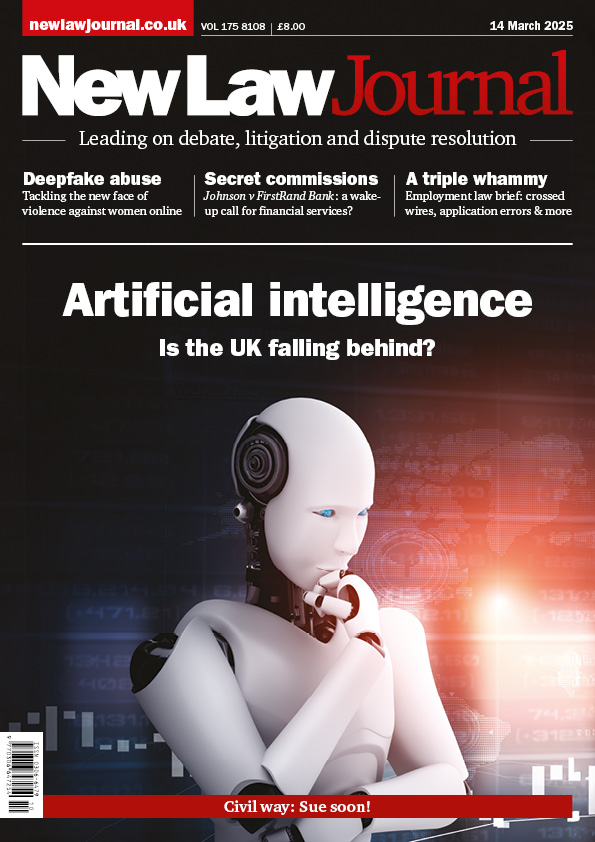THIS ISSUE

What happens where an employer thinks an employee has resigned but they haven’t? This is one of a trio of cases covered in this week’s NLJ employment law brief by Ian Smith, barrister, emeritus professor of employment law at the Norwich Law School, UEA.
Johnson v FirstRand sent ‘shockwaves through the financial services industry’, write Eddie Flanagan, partner and specialist in asset and debt recovery, and Harpreet Sandhu, Chartered Legal Executive at Shakespeare Martineau, in this week’s NLJ. They discuss the case and its astonishing implications. For example, Santander UK revealed in November that it has set aside £295m for potential compensation.
A large number of civil, family and tribunal fees are about to go up (and a couple of dozen will go down). In this week’s NLJ, former district judge Stephen Gold crunches the numbers ahead of 1 April. As Gold writes, ‘issue before then and clients will be much impressed’.
With artificial intelligence (AI) advancing at dizzying speed, is the UK too slow to regulate? In this week’s NLJ, Robert Taylor, CEO and general counsel at 360 Law Group, explores the risks of inadequate regulation in this sector, including for the economy.
How is the legal sector adapting to the use of artificial intelligence (AI) and large language models for eDisclosure? In this week’s NLJ, Jake Pennington-Slater, eDiscovery Manager, Freeths, traces the development of AI and other tech in eDisclosure in recent years and considers the future.
In an unusual case, a father recently called habeas corpus on behalf of his own children who had been placed in foster care. In this week’s NLJ, Nicholas Dobson covers The Father v Worcestershire County Council in which the Supreme Court discussed the application of the ancient writ in a very modern setting.
The rise of deepfake videos, deepfake porn and unsolicited sexual images (cyberflashing) is an alarming and increasingly prevalent problem. In this week’s NLJ, Jenni Dempster KC and Maleeka Bokhari, Red Lion Chambers, look into this abuse, the harm it causes and the legal protections that exist, notably the Online Safety Act 2023.
From deepfakes to cyberflashing, 2025 must be the year to eliminate the technology-facilitated abuse of women, write Jenni Dempster KC & Maleeka Bokhari
Good things come in threes: in this month’s employment brief, Ian Smith rounds up a triple whammy from the Employment Appeal Tribunal on crossed wires, application errors & misconduct
Is there any room for habeas corpus in the modern regime surrounding care orders? Only very exceptionally, the Supreme Court has ruled: Nicholas Dobson reports
MOVERS & SHAKERS

Freeths—Ruth Clare
National real estate team bolstered by partner hire in Manchester

Farrer & Co—Claire Gordon
Partner appointed head of family team

mfg Solicitors—Neil Harrison
Firm strengthens agriculture and rural affairs team with partner return
NEWS
Conveyancing lawyers have enjoyed a rapid win after campaigning against UK Finance’s decision to charge for access to the Mortgage Lenders’ Handbook
The Crown Prosecution Service (CPS) has launched a recruitment drive for talented early career and more senior barristers and solicitors
Regulators differed in the clarity and consistency of their post-Mazur advice and guidance, according to an interim report by the Legal Services Board (LSB)
The Solicitors Act 1974 may still underpin legal regulation, but its age is increasingly showing. Writing in NLJ this week, Victoria Morrison-Hughes of the Association of Costs Lawyers argues that the Act is ‘out of step with modern consumer law’ and actively deters fairness
A Competition Appeal Tribunal (CAT) ruling has reopened debate on the availability of ‘user damages’ in competition claims. Writing in NLJ this week, Edward Nyman of Hausfeld explains how the CAT allowed Dr Liza Lovdahl Gormsen’s alternative damages case against Meta to proceed, rejecting arguments that such damages are barred in competition law







